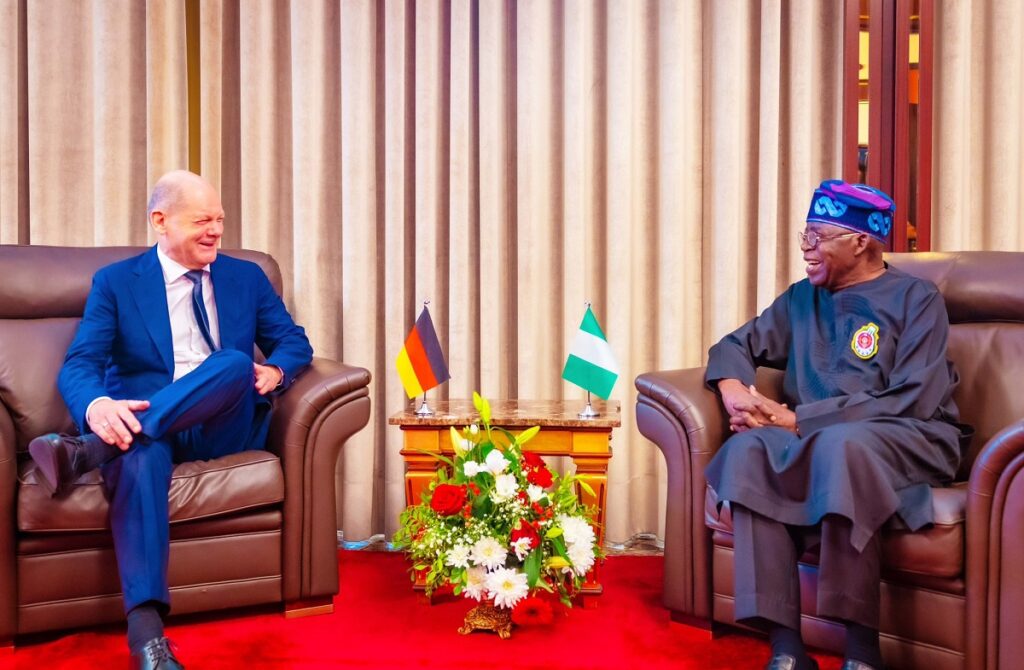- Chancellor Olaf Scholz says German companies are looking for gas deliveries from Nigeria.
- At the moment, Germany imports huge volumes of crude oil from Nigeria, but no gas.
- Nigeria boasts the largest confirmed natural gas reserves in Africa, estimated at 202 trillion cubic feet.
Europe’s economic powerhouse Germany is considering the prospect of importing natural gas from Nigeria. This plan was revealed by Chancellor Olaf Scholz during an interview with Nigerian newspaper, The Punch.
Scholz is visiting Nigeria on a mission to reinforce bilateral relations with Africa’s largest economy. His visit, the third to Africa since he took power in 2021, marks a significant milestone in fostering economic cooperation. This trip holds particular significance as it is the German leader’s first visit to Nigeria since President Bola Tinubu’s election.
“Nigeria has the biggest gas supply in Africa,” Scholz told The Punch. “German companies are interested in gas deliveries from Nigeria and look forward to cooperation with Nigerian gas companies.”
Nigeria’s natural gas potential
Nigeria boasts the largest confirmed natural gas reserves in Africa, estimated at 202 trillion cubic feet. The country has shown a strong interest in collaborating to address Europe’s energy requirements. This plan follows a move by Russia to significantly reduce its natural gas supply to Europe following the conflict with Ukraine.
Germany’s interest in importing natural gas from Nigeria underscores the strategic importance of diversifying its energy sources. As one of the world’s economic powerhouses, Germany recognizes the need for a reliable and sustainable energy supply to support its industries and households.
Natural gas, known for its cleaner and more efficient energy profile, offers an attractive alternative to traditional fossil fuels, aligning with Germany’s commitment to reduce carbon emissions and transition to greener energy solutions.
Scholz noted that Germany saw Nigeria as “a key partner for us in Africa, politically and economically.” The German chancellor, who will visit Ghana added that he was “eager to discover the country and strengthen and deepen our partnership.” Scholz said the two countries will enhance trade ties, investment, and liaise on global issues, migration and security, too.
Nigeria boasts significant natural gas reserves, making it an attractive source for energy imports. The country is a major player in the global natural gas market. Its vast reserves hold the potential to meet Germany’s energy demands while at the same time offering economic opportunities for Nigeria.
Germany diversifying energy portfolio
By importing natural gas from Nigeria, Germany will diversify its energy portfolio. In a big way, it will reduce its dependence on conventional energy sources, as it shifts towards cleaner energy.
Chancellor Scholz’s visit to Nigeria signifies a crucial step in strengthening the bilateral ties between the two countries. As Africa’s largest economy and a key player in the African continent, Nigeria holds immense potential for economic collaboration. Germany, on the other hand, with its technological expertise and economic strength, can provide valuable support to Nigeria in various sectors, including infrastructure, manufacturing, and renewable energy.
At the moment, Germany imports huge volumes of crude oil from Nigeria, but no gas. “Germany has a considerable demand for natural gas and, going forward, hydrogen to fuel its economy and energy transition. Concrete amounts should be agreed on in negotiations between Nigerian gas producers and German gas traders,” said Scholz.
Read also: Guinness Nigeria to stop importing Johnnie Walker as Forex sting persists
Economic implications
The prospect of importing natural gas from Nigeria not only promises to secure Germany’s energy future but also opens up opportunities for economic growth and cooperation. The energy sector has long been a driver of economic development, and this potential trade partnership can be a win-win for both nations. It will create jobs, stimulate investments, and foster technological exchange.
According to Scholz, Nigeria was Germany’s second biggest trading partner in sub-Saharan Africa. Data shows direct German investments in the West African country hit $158 million as of 2021.
The German leader said Nigeria presents a chance for further investments. These include “infrastructure and energy to agriculture business, mineral resources, information and communication technologies, transport and logistics, and beyond.”
“Nigeria is still crawling, but we are determined to change the narrative and bring about a transformative government in the country,” Nigeria President Bola Tinubu said.
Germany’s exploration of natural gas imports from Nigeria represents a promising step towards a strengthened partnership between two influential nations. As both countries work towards their respective economic and environmental goals, this collaboration could serve as a model for international cooperation in a changing global landscape. The potential benefits in terms of energy security, economic growth, and environmental sustainability make this development an exciting prospect for both Germany and Nigeria.
